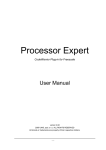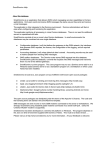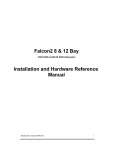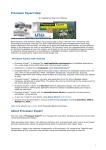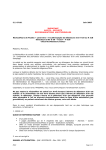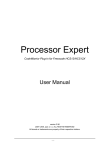Download NMEA data parser plugin module
Transcript
HelpAndManual_unregistered_evaluation_copy NMEA data parser plugin module © 2006 AGG Software HelpAndManual_unregistered_evaluation_copy NMEA data parser plugin module © 2006 AGG Software All rights reserved. No parts of this work may be reproduced in any form or by any means - graphic, electronic, or mechanical, including photocopying, recording, taping, or information storage and retrieval systems - without the written permission of the publisher. Products that are referred to in this document may be either trademarks and/or registered trademarks of the respective owners. The publisher and the author make no claim to these trademarks. While every precaution has been taken in the preparation of this document, the publisher and the author assume no responsibility for errors or omissions, or for damages resulting from the use of information contained in this document or from the use of programs and source code that may accompany it. In no event shall the publisher and the author be liable for any loss of profit or any other commercial damage caused or alleged to have been caused directly or indirectly by this document. Printed: Ñåíòÿáðü 2007 Publisher AGG Software Production © 2006 AGG Software http://www.aggsoft.com Contents I Table of Contents Part 1 Introduction 1 Part 2 System requirements 1 Part 3 Installation 2 Part 4 User Manual 3 1 Supported ................................................................................................................................... talkers 3 2 Supported ................................................................................................................................... sentences 4 3 Common ................................................................................................................................... parameters 12 4 Filter ................................................................................................................................... 13 5 NMEA sentences ................................................................................................................................... parser 14 6 Syntax of ................................................................................................................................... Regular Expressions 15 © 2006 AGG Software 1 NMEA data parser plugin module 1 Introduction The National Marine Electronics Association (NMEA) has developed a specification that defines the interface between various pieces of marine electronic equipment. An NMEA standard defines an electrical interface and data protocol for communications between marine instrumentation. (They may also have standards for other things.) NMEA 0183 devices are designated as either talkers or listeners (with some devices being both), employing an asynchronous serial interface with the following parameters: Baud rate: 4800, Number of data bits: 8 (bit 7 is 0), Stop bits: 1 (or more), Parity: none, Handshake: none. NMEA 0183 allows a single talker and several listeners on one circuit. GPS receiver communication is defined within this specification. Most computer programs that provide real time position information understand and expect data to be in NMEA format. This data includes the complete PVT (position, velocity, time) solution computed by the GPS receiver. The idea of NMEA is to send a line of data called a sentence that is totally self contained and independent from other sentences. There are standard sentences for each device category and there is also the ability to define proprietary sentences for use by the individual company. All of the standard sentences have a two letter prefix that defines the device that uses that sentence type. (For GPS receivers the prefix is GP.) which is followed by a three letter sequence that defines the sentence contents. In addition NMEA permits hardware manufactures to define their own proprietary sentences for whatever purpose they see fit. All proprietary sentences begin with the letter P and are followed with 3 letters that identifies the manufacturer controlling that sentence. For example a Garmin sentence would start with PGRM and Magellan would begin with PMGN. Our module parse each sentence begins with a '$' and ends with CRLF (a carriage return/line feed sequence). The data is contained within this single line with data items separated by commas. The data itself is just ASCII text and may extend over multiple sentences in certain specialized instances but is normally fully contained in one variable length sentence. The data may vary in the amount of precision contained in the message. For example time might be indicated to decimal parts of a second or location may be show with 3 or even 4 digits after the decimal point. There is a provision for a checksum at the end of each sentence which may or may not be checked by the unit that reads the data. The checksum field consists of a '*' and two hex digits. Our parser module splits all data to variables and this variables can be used in data export modules. 2 System requirements To run the program one of the following operation systems is needed: · · · · · Windows Windows Windows Windows Windows 95; 95 OSR2; 98; Me; NT4, Windows 2000, Windows XP, Windows 2003 (administrator rights needed). Advanced NMEA Data Logger installed on your computer. © 2006 AGG Software System requirements 3 Installation 1. 2. 3. 4. 5. Close main application, if it was run; Copy module distributive file to your hard disk; Run file on execution, clicking twice in Explorer on its name; Execute setup wizard's instructions. In common case, if earlier was installed main application, enough to press several times button "Next". All necessary for installation data, wizard will get himself; Restart main application. In case of successful installation module name will show up in options, on tab "Modules". If , due to some reasons, You couldn't install publication module, so consult technical support service on address [email protected] and our professionals will be glad to help you. If module is compatible with our program, its brief description You will see in module list (pic.1). Some modules may demand additional setting. To output module setting dialog select it from the list and press button "Setup". © 2006 AGG Software 2 3 NMEA data parser plugin module Pic.1. Installed plugin modules 4 User Manual 4.1 Supported talkers AG - Autopilot - General AP - Autopilot - Magnetic CD - Communications – Digital Selective Calling (DSC) CR - Communications – Receiver / Beacon Receiver CS - Communications – Satellite CT - Communications – Radio-Telephone (MF/HF) CV - Communications – Radio-Telephone (VHF) CX - Communications – Scanning Receiver DF - Direction Finder EC - Electronic Chart Display & Information System (ECDIS) EP - Emergency Position Indicating Beacon (EPIRB) ER - Engine Room Monitoring Systems GP - Global Positioning System (GPS) HC - Heading – Magnetic Compass HE - Heading – North Seeking Gyro © 2006 AGG Software User Manual HN - Heading – Non North Seeking Gyro II - Integrated Instrumentation IN - Integrated Navigation LC - Loran C P - Proprietary Code RA - RADAR and/or ARPA SD - Sounder, Depth SN - Electronic Positioning System, other/general SS - Sounder, Scanning TI - Turn Rate Indicator VD - Velocity Sensor, Doppler, other/general DM - Velocity Sensor, Speed Log, Water, Magnetic VW - Velocity Sensor, Speed Log, Water, Mechanical WI - Weather Instruments YX - Transducer ZA - Timekeeper – Atomic Clock ZC - Timekeeper – Chronometer ZQ - Timekeeper – Quartz ZV - Timekeeper – Radio Update, WWV or WWVH 4.2 Supported sentences AAM - Waypoint arrival alarm AAM_ARIV_ENT - Arrival circle entered AAM_PERP_PASS - Perpendicular passed AAM_CIRCLE_RAD - Circle radius AAM_CIRCLE_RAD_UNIT - Circle radius units AAM_WPTNAME - Waypoint name ALM - GPS Almanac data ALM_SENT_NUM - Number of sentences ALM_SENT_CNT - Sentence count ALM_PRN_ID - Satellite PRN number ALM_WEEK_NO - GPS week number ALM_SV_HEALTH - SV health ALM_ECCENTRICITY - Eccentricity ALM_REF_TIME - Almanac reference time ALM_INC_ANGLE - Inclination angle ALM_RA_RATE - Rate of right ascension ALM_AXIS_ROOT - Root of semi-major axis ALM_PEREGREE_ARG - Argument of perigee ALM_NODE_LONG - Longitude of ascension node ALM_MEAN_ANN - Mean anomaly ALM_F0_CLOCK - F0 clock parameter ALM_F1_CLOCK - F1 clock parameter APA - Auto pilot A sentence APA_STATUS1 - Loran-C blink/SNR warning, general warning APA_STATUS2 - Loran-C cycle warning APA_CROSS_TRACK_RAD - Cross-track error distance APA_STEER - Steer to correct APA_CROSS_TRACK_RAD_UNIT - Cross-track error units APA_ARIV_ALRM_C - Arrival alarm - circle © 2006 AGG Software 4 5 NMEA data parser plugin module APA_ARIV_ALRM_P - Arrival alarm - perpendicular APA_MAG_BEAR_OD - Magnetic bearing, origin to destination APA_MAG_BEAR_OD_UNIT - Magnetic bearing unit APA_DEST_WPTID - Destination waypoint ID APB - Auto pilot B sentence APB_STATUS1 - Loran-C blink/SNR warning, general warning APB_STATUS2 - Loran-C cycle warning APB_CROSS_TRACK_RAD - Cross-track error distance APB_STEER - Steer to correct APB_CROSS_TRACK_RAD_UNIT - Cross-track error units APB_ARIV_ALRM_C - Arrival alarm - circle APB_ARIV_ALRM_P - Arrival alarm - perpendicular APB_MAG_BEAR_OD - Magnetic bearing, origin to destination APB_MAG_BEAR_OD_UNIT - Magnetic bearing unit APB_DEST_WPTID - Destination waypoint ID APB_MAG_BEAR_PD - Magnetic bearing, present position to destination APB_MAG_BEAR_PD_UNIT - Magnetic bearing unit APB_MAG_BEAR_HS - Magnetic heading to steer APB_MAG_BEAR_HS_UNIT - Magnetic heading unit BEC - Bearing and distance to waypoint – dead reckoning BEC_UTC - UTC time of fix BEC_WPT_LAT - Latitude of waypoint BEC_WPT_LAT_H - Latitude hemisphere BEC_WPT_LONG - Longitude of waypoint BEC_WPT_LONG_H - Longitude hemisphere BEC_BEARING - Bearing to waypoint BEC_BEAR_TYPE - Bearing to waypoint type BEC_DIST - Distance to waypoint BEC_DIST_UNIT - Distance to waypoint units BEC_WPTID - Waypoint ID BOD - Bearing origin to destination BOD_BEARING - Bearing from START to DEST, degrees BOD_BEAR_TYPE - Bearing from START to DEST type BOD_DEST_WPTID - Destination waypoint ID BOD_ORIG_WPTID - Origin waypoint ID BWC - Bearing using great circle route BWC_DEPTH - Depth BWC_DEPTH_UNIT - Depth unit DBS - Depth below surface DBS_DEPTH - Depth, meters DBS_OFFSET - Offset from transducer FSI - Frequency set information FSI_TX_FREQ - Transmitting frequency FSI_RX_FREQ - Receiving frequency FSI_COMM_MODE - Communications mode FSI_POWER_LEVEL - Power Level GGA - GPS fix data GGA_TAKEN_AT - Fix taken at GGA_LATITUDE_DEG - Latitude GGA_LATITUDE_DEG_H - Latitude hemisphere GGA_LONGITUDE_DEG - Longitude GGA_LONGITUDE_DEG_H - Longitude hemisphere GGA_QUALITY - Fix quality © 2006 AGG Software User Manual GGA_SAT_NUM - Number of satellites being tracked GGA_HOR_DIL - Horizontal dilution of position GGA_ALTITUDE - Altitude above mean sea level GGA_ALTITUDE_UNIT - Altitude units GGA_HEIGHT_OF_GEOID - Height of geoid (mean sea level) above WGS84 ellipsoid GGA_HEIGHT_OF_GEOID_UNIT - Height of geoid units GGA_TIME_SNC_DGPS - Time in seconds since last DGPS update GGA_DGPS_ID - DGPS station ID number GLC - Geographic position, Loran-C GLC_GRI_MS - GRI Microseconds GLC_TOA_MS - Master TOA microseconds GLC_TOA_STATUS - Master TOA signal status GLC_TIME_DIFF_MS - Time difference in microseconds GLC_TIME_DIFF_STATUS - Time difference signal status GLL - Geographic position, lat/lon data GLL_LATITUDE_DEG - Latitude GLL_LATITUDE_DEG_H - Latitude hemisphere GLL_LONGITUDE_DEG - Longitude GLL_LONGITUDE_DEG_H - Longitude hemisphere GLL_TAKEN_AT - Fix taken at GLL_STATUS - Status GSA - Overall satellite data GSA_AUTO_SEL - Auto selection of 2D or 3D fix GSA_3D_FIX - 3D fix GSA_SAT_PRN - Sat used for fix GSA_PDOP - Dilution of precision GSA_HDOP - Horizontal dilution of precision GSA_VDOP - Vertical dilution of precision GSV - Detailed satellite data GSV_SENT_NUM - Number of sentences GSV_SENT_CNT - Sentence count GSV_SAT_IN_VIEW - Number of satellites in view GSV_SAT_PRN - Satellite PRN number GSV_ELEVATION - Elevation, degrees GSV_AZIMUTH - Azimuth, degrees GSV_SNR - SNR - higher is better GTD - Geographic location in time differences GTD_TIME_DIFF - Time difference HDG - Heading, deviation and variation HDG_MAG_HEAD - Magnetic sensor heading in degrees HDG_MAG_DEV - Magnetic deviation in degrees HDG_MAG_DEV_DIR - Magnetic deviation direction HDG_MAG_VAR - Magnetic variation in degrees HDG_MAG_VAR_DIR - Magnetic variation direction HDM - Heading, magnetic HDM_HEADING - Heading in degrees HDM_HEADING_UNIT - Heading unit HDT - Heading, true HDT_HEADING - Heading in degrees HDT_HEADING_UNIT - Heading unit LCD - Loran-C signal data LCD_GRI_MS - GRI Microseconds LCD_MR_SNR - Master relative SNR © 2006 AGG Software 6 7 NMEA data parser plugin module LCD_MR_ECD - Master relative ECD LCD_TIME_DIFF_MS - Time difference in microseconds LCD_TIME_DIFF_STATUS - Time difference signal status MSK - Send control for a beacon receiver MSK_FREQ - Frequency MSK_FREQ_MODE - Frequency mode MSK_BITRATE - Bitrate MSK_BITRATE_MODE - Bitrate mode MSK_FREQ_STATUS - Frequency for MSS message status MSS - Beacon receiver status information MSS_SIGNAL_S - Signal strength in dB MSS_SIGNAL_N - Signal to noise ratio in dB MSS_BEACON_FREQ - Beacon frequency in KHz MSS_BEACON_BITRATE - Beacon bitrate in bps MTW - Water temperature MTW_DEGREES - Degrees MTW_DEGREES_UNIT - Unit of measurement MWV - Wind speed and angle MWV_ANGLE - Wind angle MWV_REF - Reference MWV_SPEED - Wind speed MWV_SPEED_UNIT - Wind speed unit MWV_STATUS - Status OSD - Own ship data OSD_HEADING - Heading true, degrees OSD_STATUS - Status OSD_VESSEL - Vessel ñourse true, degrees OSD_VESSEL_REF - Course reference OSD_VESSEL_SPEED - Vessel speed OSD_SPEED_REF - Speed reference OSD_VESSEL_SET - Vessel set true, degrees OSD_VESSEL_DRIFT - Vessel drift true, degrees OSD_VESSEL_DRIFT_UNIT - Vessel drift unit ROO - Waypoints in active route ROO_WPT_ID - Waypoint identifier RMA - Recommended minimum navigation information RMA_STATUS - Status RMA_LATITUDE_DEG - Latitude RMA_LATITUDE_DEG_H - Latitude hemisphere RMA_LONGITUDE_DEG - Longitude RMA_LONGITUDE_DEG_H - Longitude hemisphere RMA_TIME_DIFF_A - Time difference A RMA_TIME_DIFF_B - Time difference B RMA_SPEED - Speed over the ground in knots RMA_TRACK_ANGLE - Track angle in degrees RMA_MAGN_VAR - Magnetic variation RMA_MAGN_VAR_H - Magnetic variation hemisphere RMB - Recommended minimum navigation information RMB_STATUS - Status RMB_CROSS_TRACK_ERR - Cross-track error RMB_CROSS_TRACK_ERR_DIR - Cross-track error steer RMB_ORIG_WPTID - Origin waypoint ID RMB_DEST_WPTID - Destination waypoint ID © 2006 AGG Software User Manual RMB_WPT_LAT - Latitude of destination waypoint RMB_WPT_LAT_H - Latitude hemisphere RMB_WPT_LONG - Longitude of destination waypoint RMB_WPT_LONG_H - Longitude hemisphere RMB_RANGE - Range to destination, nautical miles RMB_BEAR - True bearing to destination RMB_BEAR - Velocity towards destination, knots RMB_ARIV_ALRM - Arrival alarm RMC - Recommended minimum navigation information RMC_TAKEN_AT - Fix taken at RMC_STATUS - Status RMC_LATITUDE_DEG - Latitude RMC_LATITUDE_DEG_H - Latitude hemisphere RMC_LONGITUDE_DEG - Longitude RMC_LONGITUDE_DEG_H - Longitude hemisphere RMC_SPEED - Speed over the ground in knots RMC_TRACK_ANGLE - Track angle in degrees RMC_DATE - Date RMC_MAGN_VAR - Magnetic variation RMC_MAGN_VAR_H - Magnetic variation hemisphere ROT - Rate of turn ROT_RATE_OF_TURN - Rate of turn, degrees per minute ROT_STATUS - Status RPM - Revolutions RPM_SOURCE - Source RPM_NUM - Engine or shaft number RPM_SPEED - Speed, revolutions per minute RPM_PITCH - Propeller pitch, % of maximum RPM_STATUS - Status RSA - Rudder sensor angle RSA_SR_SENSOR - Starboard (or single) rudder sensor RSA_STATUS - Starboard rudder sensor status RSA_PR_SENSOR - Port rudder sensor RSA_STATUS - Port rudder sensor status RSD - Radar system data RSD_CURSOR_RANGE - Cursor range from own ship RSD_CURSOR_BEARING - Cursor bearing CW from zero, degrees RSD_RANGE_SCALE - Range scale RSD_RANGE_UNIT - Range units RTE - Route message RTE_SENT_NUM - Number of sentences RTE_SENT_CNT - Sentence count RTE_TYPE - Type RTE_TYPE_NAME - Type name RTE_ID - Route identifier RTE_WPT_ID - Waypoint identifier SFI - Scanning frequency information SFI_SENT_NUM - Number of sentences SFI_SENT_CNT - Sentence count SFI_FREQ - Frequency SFI_MODE - Mode STN - Multiple data ID STN_ID - Talker ID number © 2006 AGG Software 8 9 NMEA data parser plugin module TTM - Tracked target message TTM_TARGET_NUM - Target number TTM_TARGET_DIST - Target distance TTM_BEARING - Bearing from own ship TTM_BEAR_TYPE - Bearing units TTM_TARGET_SPEED - Target speed TTM_TARGET_COURSE - Target course TTM_COURSE_UNIT - Course units TTM_DIST_CPA - Distance of closest-point-of-approach TTM_TIME_CPA - Time until closest-point-of-approach '-' means increasing TTM_SIGN - '-' means increasing TTM_TARGET_NAME - Target name TTM_TARGET_STATUS - Target status TTM_REF_TARGET - Reference target VBW - Dual ground/water speed VBW_WATER_LONG_SPEED - Longitudinal water speed VBW_WATER_TRAV_SPEED - Transverse water speed VBW_WATER_STATUS - Water speed status VBW_GROUND_LONG_SPEED - Longitudinal ground speed VBW_GROUND_TRAV_SPEED - Transverse ground speed VBW_GROUND_STATUS - Ground speed status VDR - Set and drift VDR_DEGRESS - Degress VDR_DEGRESS_TYPE - Degress type VDR_SPEED - Speed VDR_SPEED_UNIT - Speed units VHW - Water speed and heading VHW_DEGRESS - Degress VHW_DEGRESS_TYPE - Degress type VHW_SPEED - Speed VHW_SPEED_UNIT - Speed units VLW - Distance traveled through water VLW_TOTAL - Total cumulative distance VLW_TOTAL_UNIT - Total cumulative distance unit VLW_RESET - Distance since Reset VLW_RESET_UNIT - Distance since Reset unit VPW - Speed, measured parallel to wind VPW_SPEED - Speed VPW_SPEED_UNIT - Speed units VTG - Vector track an speed over the ground VTG_MAG_TRACK - Track made VTG_MAG_TRACK_TYPE - Track made type VTG_SPEED - Ground speed VTG_SPEED_UNIT - Ground speed units VWR - Relative wind speed and angle VWR_WIND_DIR - Wind direction magnitude in degrees VWR_WIND_DIR_TYPE - Wind direction type VWR_SPEED - Speed VWR_SPEED_UNIT - Speed units WCV - Waypoint closure velocity WCV_VELOCITY - Velocity WCV_VELOCITY_UNIT - Velocity units WCV_WPT_ID - Waypoint identifier © 2006 AGG Software User Manual WNC - Distance, waypoint to waypoint WNC_DISTANCE - Distance WNC_DISTANCE_UNIT - Distance units WNC_DEST_WPTID - Destination waypoint ID WNC_ORIG_WPTID - Origin waypoint ID WPL - Waypoint information WPL_LATITUDE_DEG - Latitude WPL_LATITUDE_DEG_H - Latitude hemisphere WPL_LONGITUDE_DEG - Longitude WPL_LONGITUDE_DEG_H - Longitude hemisphere WPL_WPTNAME - Waypoint name XDR - Multiple cross rrack error, dead reckoning XDR_TRANS_TYPE - Transducer type XDR_MEASURE_DATA - Measurement data XDR_MEASURE_UNIT - Measurement data units XDR_TRANS_NAME - Name of transducer XTE - Measured cross track error XTE_GEN_WARN - General warning flag XTE_LORAN_LOCK - Loran-C cycle lock flag XTE_CROSS_TRACK_DIST - Cross track error distance XTE_STEER - Steer XTE_DIST_UNIT - Distance units XTR - Cross rrack error, dead reckoning XTR_TRANS_TYPE - Transducer type XTR_MEASURE_DATA - Measurement data XTR_MEASURE_UNIT - Measurement data units XTR_TRANS_NAME - Name of transducer ZDA - Date and Time ZDA_TIME - Time ZDA_DAY - Day ZDA_MONTH - Month ZDA_YEAR - Year ZDA_ZONE_HOUR - Local zone hours ZDA_ZONE_MIN - Local zone minutes ZFO - UTC and time to destination waypoint ZFO_TIME - Time ZFO_TIME_REMAIN - Time remaining ZFO_WPT_ID - Waypoint identifier GRMC - Sensor configuration information GRMC_MODE - Fix mode GRMC_ALT - Altitude above/below mean sea level GRMC_DATUM_INDEX - Earth datum index GRMC_DATUM_AXIS - User earth datum semi-major axis GRMC_DATUM_FACTOR - User earth datum inverse flattening factor GRMC_DATUM_DELTA_X - User earth datum delta x earth centered coordinate GRMC_DATUM_DELTA_Y - User earth datum delta y earth centered coordinate GRMC_DATUM_DELTA_Z - User earth datum delta z earth centered coordinate GRMC_DIFF_MODE - Differential mode GRMC_BAUD_RATE - NMEA Baud rate GRMC_FILTER_MODE - Filter mode GRMC_PPS_MODE - PPS mode GRME - Estimated position error GRME_HPE - Estimated horizontal position error (HPE) © 2006 AGG Software 10 11 NMEA data parser plugin module GRME_HPE_UNIT - HPE units GRME_VPE - Estimated vertical error (VPE) GRME_VPE_UNIT - VPE units GRME_OSEPE - Overall spherical equivalent position error (OSEPE) GRME_OSEPE_UNIT - SEPE units GRMF - Position fix sentence GRMF_WEEK_NO - GPS week number GRMF_SEC_NUM - GPS seconds GRMF_UTC_DATE - UTC date of position fix GRMF_UTC_TIME - UTC time of position fix GRMF_LEAP_SEC_NUM - GPS leap second count GRMF_LATITUDE_DEG - Latitude GRMF_LATITUDE_DEG_H - Latitude hemisphere GRMF_LONGITUDE_DEG - Longitude GRMF_LONGITUDE_DEG_H - Longitude hemisphere GRMF_MODE - Mode GRMF_FIX_TYPE - Fix type GRMF_SPEED - Speed over ground, km/h GRMF_COURSE - Course over ground, degrees GRMF_DIL_POS - Position dilution of precision GRMF_TIME_DIL_POS - Time dilution of precision GRMI - Sensor initialisation information GRMI_LATITUDE_DEG - Latitude GRMI_LATITUDE_DEG_H - Latitude hemisphere GRMI_LONGITUDE_DEG - Longitude GRMI_LONGITUDE_DEG_H - Longitude hemisphere GRMI_UTC_DATE - Current UTC date GRMI_UTC_TIME - Current UTC time GRMM - Map datum GRMM_DATUM - Currently active horizontal datum GRMO - Output sentence enable/disable GRMO_NAME - Target sentence description GRMO_MODE - Target sentence mode GRMV - 3D velocity GRMV_EAST_VEL - True east velocity GRMV_NORTH_VEL - True north velocity GRMV_UP_VEL - Up velocity GRMZ - Altitude information GRMZ_ALT - Altitude GRMZ_ALT_UNIT - Altitude units GRMZ_POS_FIX_DIM - Position fix dimensions SLIB - Differental GPS beacon receiver control SLIB_FREQ - Frequency SLIB_BITRATE - Bit rate SLIB_REQ_TYPE - Request type SRF150 - OK to send SRF150_STATUS - Status SRF161 - OK to send SRF161_ANT_STATUS - Antenna status SRF161_AGC - AGC © 2006 AGG Software User Manual 4.3 12 Common parameters These parameters are used for data parsing (pic.2). 1. 2. 3. Add date/time stamp to each sentence parsed - the parser will add an additional stamp value to other values, that the parser will extract from a data block; Add serial port number to each sentence parsed - the parser will add an additional value with serial port number, that received this data block. You can use it in a multi port configuration, for identifying sentences from different serial ports. Verify sentence checksum if available - the parser will calculate a checksum and verify it for each sentence that will contain '*' characters at the end of sentence: Sentence example: GPGGA,123519,4807.038,N,01131.000,E,1,08,0.9,545.4,M,46.9,M,,*47 Pic.2. Common parameters. Aggregate sentences This option is very useful if your talker sends more than one sentence and you want to save data to a file at single row. You can aggregate two or more sentences and data of these sentences will be send to data export modules at same moment with one date time stamp. If you'll specify sentence names then the module will store all data in a temporary buffer, while all sentences isn't received. When all data is received the module sends data to a data export module, clears the buffer and starts waiting for new data. You can specify one or more different aggregate groups. Simply add sentence name to different © 2006 AGG Software 13 NMEA data parser plugin module rows. Sentences in the row should be separated by comma and a sentence should contain a talker name. 4.4 Filter Filter are intended for ignoring some packages of the data. The ignored data's packages will not be published with a data publication plugins. Pic.3 Filter rules For filtration it's possible to set one or several rules. At execution of any of rules it will be fulfilled operation selected in the field "Action". Action types · Ignore - current sentence will be ignore and data from this sentence will not export · Parse - current sentence will be parse and data from this sentence will export That operation is fulfilled observance of the condition set in the field "Situation" was necessary. Situation types · Disabled - this rule have been disabled; · Contains - this rule will be true if sentence contains string, specified in the filed "Expression"; · Not contains - this rule will be true if sentence not contains string, specified in the filed " Expression"; © 2006 AGG Software User Manual Expression, specified in the field "Expression" can be two types: Text - the program will search, data specified in the field "Expression", in a sentence. This searching is case sensitive. Reg. expr. - the program will search data use regular expression, specified in the field "Expression", in a sentence. This searching is case insensitive. 4.5 NMEA sentences parser If you want to export to any target, then you should configure a parser module. The ASCII data parser allows you to extract data from data flow, that contains a ASCII characters. The parser module splits data flow to data block and extracts data values from each data block. On the "sentence" tab (pic.4) you should specify sentences, that the parser will parse. Other sentences will be ignored. Pic.4. NMEA sentences. The full list of supported sentences and variables that parsed from each sentence is listed here. Our software create variables with following types: · String - Character array with length from 1 to 65535 characters; · Boolean - Logical value ( Truth/False) - 0 or 1; · Float - Broken (natural) number - value range: -2.9 x 10^-39 .. 1.7 x 10^38 · Integer - Integer value: -2147483648..2147483647; © 2006 AGG Software 14 15 NMEA data parser plugin module · DateTime - Date and time. Note: Our modules doesn't support Time and Date data types. Therefore time variables, that exists in a sentence contains current date, but with time from the sentence. 4.6 Syntax of Regular Expressions Introduction Regular Expressions are a widely-used method of specifying patterns of text to search for. Special metacharacters allow You to specify, for instance, that a particular string You are looking for occurs at the beginning or end of a line, or contains n recurrences of a certain character. Regular expressions look ugly for novices, but really they are very simple, handy and powerful tool. Let's start our learning trip! Simple matches Any single character matches itself, unless it is a metacharacter with a special meaning described below. A series of characters matches that series of characters in the target string, so the pattern "bluh" would match "bluh'' in the target string. Quite simple, eh ? You can cause characters that normally function as metacharacters or escape sequences to be interpreted literally by 'escaping' them by preceding them with a backslash "\", for instance: metacharacter "^" match beginning of string, but "\^" match character "^", "\\" match "\" and so on. Examples: foobar \^FooBarPtr matchs string 'foobar' matchs '^FooBarPtr' Escape sequences Characters may be specified using a escape sequences syntax much like that used in C and Perl: "\n'' matches a newline, "\t'' a tab, etc. More generally, \xnn, where nn is a string of hexadecimal digits, matches the character whose ASCII value is nn. If You need wide (Unicode) character code, You can use '\x{nnnn}', where 'nnnn' - one or more hexadecimal digits. \xnn \x{nnnn} \t \n \r \f \a char with hex code nn char with hex code nnnn (one byte for plain text and two bytes for Unicode) tab (HT/TAB), same as \x09 newline (NL), same as \x0a car.return (CR), same as \x0d form feed (FF), same as \x0c alarm (bell) (BEL), same as \x07 © 2006 AGG Software User Manual escape (ESC), same as \x1b \e Examples: foo\x20bar \tfoobar matchs 'foo bar' (note space in the middle) matchs 'foobar' predefined by tab Character classes You can specify a character class, by enclosing a list of characters in [], which will match any one character from the list. If the first character after the "['' is "^'', the class matches any character not in the list. Examples: foob[aeiou]r foob[^aeiou]r finds strings 'foobar', 'foober' etc. but not 'foobbr', 'foobcr' etc. find strings 'foobbr', 'foobcr' etc. but not 'foobar', 'foober' etc. Within a list, the "-'' character is used to specify a range, so that a-z represents all characters between "a'' and "z'', inclusive. If You want "-'' itself to be a member of a class, put it at the start or end of the list, or escape it with a backslash. If You want ']' you may place it at the start of list or escape it with a backslash. Examples: [-az] [az-] [a\-z] [a-z] [\n-\x0D] [\d-t] []-a] matchs 'a', 'z' and '-' matchs 'a', 'z' and '-' matchs 'a', 'z' and '-' matchs all twenty six small characters from 'a' to 'z' matchs any of #10,#11,#12,#13. matchs any digit, '-' or 't'. matchs any char from ']'..'a'. Metacharacters Metacharacters are special characters which are the essence of Regular Expressions. There are different types of metacharacters, described below. Metacharacters - line separators ^ $ \A \Z . start of line end of line start of text end of text any character in line Examples: ^foobar foobar$ ^foobar$ foob.r © 2006 AGG Software matchs string 'foobar' only if it's at the beginning of line matchs string 'foobar' only if it's at the end of line matchs string 'foobar' only if it's the only string in line matchs strings like 'foobar', 'foobbr', 'foob1r' and so on 16 17 NMEA data parser plugin module The "^" metacharacter by default is only guaranteed to match at the beginning of the input string/text, the "$" metacharacter only at the end. Embedded line separators will not be matched by "^'' or "$''. You may, however, wish to treat a string as a multi-line buffer, such that the "^'' will match after any line separator within the string, and "$'' will match before any line separator. The ".'' metacharacter by default matches any character. Note that "^.*$" (an empty line pattern) doesnot match the empty string within the sequence \x0D\x0A, but matchs the empty string within the sequence \x0A\x0D. Metacharacters - predefined classes \w \W \d \D \s \S an alphanumeric character (including "_") a nonalphanumeric a numeric character a non-numeric any space (same as [ \t\n\r\f]) a non space You may use \w, \d and \s within custom character classes. Examples: matchs strings like 'foob1r', ''foob6r' and so on but not 'foobar', 'foobbr' and so foob\dr on foob[\w\s]r matchs strings like 'foobar', 'foob r', 'foobbr' and so on but not 'foob1r', 'foob=r' and so on Metacharacters - iterators Any item of a regular expression may be followed by another type of metacharacters - iterators. Using this metacharacters You can specify number of occurences of previous character, metacharacter or subexpression. * + ? {n} {n,} {n,m} *? +? ?? {n}? {n,}? {n,m}? zero or more ("greedy"), similar to {0,} one or more ("greedy"), similar to {1,} zero or one ("greedy"), similar to {0,1} exactly n times ("greedy") at least n times ("greedy") at least n but not more than m times ("greedy") zero or more ("non-greedy"), similar to {0,}? one or more ("non-greedy"), similar to {1,}? zero or one ("non-greedy"), similar to {0,1}? exactly n times ("non-greedy") at least n times ("non-greedy") at least n but not more than m times ("non-greedy") So, digits in curly brackets of the form {n,m}, specify the minimum number of times to match the item n and the maximum m. The form {n} is equivalent to {n,n} and matches exactly n times. The form {n,} matches n or more times. There is no limit to the size of n or m, but large numbers will chew up more memory and slow down r.e. execution. © 2006 AGG Software User Manual 18 If a curly bracket occurs in any other context, it is treated as a regular character. Examples: foob.*r foob.+r foob.?r fooba{2}r fooba{2,}r fooba{2,3}r matchs strings like 'foobar', 'foobalkjdflkj9r' and 'foobr' matchs strings like 'foobar', 'foobalkjdflkj9r' but not 'foobr' matchs strings like 'foobar', 'foobbr' and 'foobr' but not 'foobalkj9r' matchs the string 'foobaar' matchs strings like 'foobaar', 'foobaaar', 'foobaaaar' etc. matchs strings like 'foobaar', or 'foobaaar' but not 'foobaaaar' A little explanation about "greediness". "Greedy" takes as many as possible, "non-greedy" takes as few as possible. For example, 'b+' and 'b*' applied to string 'abbbbc' return 'bbbb', 'b+?' returns 'b', 'b*?' returns empty string, 'b{2,3}?' returns 'bb', 'b{2,3}' returns 'bbb'. Metacharacters - alternatives You can specify a series of alternatives for a pattern using "|'' to separate them, so that fee|fie|foe will match any of "fee'', "fie'', or "foe'' in the target string (as would f(e|i|o)e). The first alternative includes everything from the last pattern delimiter ("('', "['', or the beginning of the pattern) up to the first "|'', and the last alternative contains everything from the last "|'' to the next pattern delimiter. For this reason, it's common practice to include alternatives in parentheses, to minimize confusion about where they start and end. Alternatives are tried from left to right, so the first alternative found for which the entire expression matches, is the one that is chosen. This means that alternatives are not necessarily greedy. For example: when matching foo|foot against "barefoot'', only the "foo'' part will match, as that is the first alternative tried, and it successfully matches the target string. (This might not seem important, but it is important when you are capturing matched text using parentheses.) Also remember that "|'' is interpreted as a literal within square brackets, so if You write [fee|fie|foe] You're really only matching [feio|]. Examples: foo(bar|foo) matchs strings 'foobar' or 'foofoo'. Metacharacters - subexpressions The bracketing construct ( ... ) may also be used for define r.e. subexpressions. Subexpressions are numbered based on the left to right order of their opening parenthesis. First subexpression has number '1' Examples: (foobar){8,10} matchs strings which contain 8, 9 or 10 instances of the 'foobar' foob([0-9]|a+)r matchs 'foob0r', 'foob1r' , 'foobar', 'foobaar', 'foobaar' etc. Metacharacters - backreferences Metacharacters \1 through \9 are interpreted as backreferences. \<n> matches previously matched subexpression #<n>. Examples: (.)\1+ © 2006 AGG Software matchs 'aaaa' and 'cc'. 19 NMEA data parser plugin module also match 'abab' and '123123' (.+)\1+ (['"]?)(\d+)\1 matchs '"13" (in double quotes), or '4' (in single quotes) or 77 (without quotes) etc Modifiers Modifiers are for changing behaviour of parser. There are many ways to set up modifiers. Any of these modifiers may be embedded within the regular expression itself using the (?...) construct. i Do case-insensitive pattern matching (using installed in you system locale settings). m Treat string as multiple lines. That is, change "^'' and "$'' from matching at only the very start or end of the string to the start or end of any line anywhere within the string. s Treat string as single line. That is, change ".'' to match any character whatsoever, even a line separators, which it normally would not match. g Non standard modifier. Switching it Off You'll switch all following operators into non-greedy mode (by default this modifier is On). So, if modifier /g is Off then '+' works as '+?', '*' as '*?' and so on x Extend your pattern's legibility by permitting whitespace and comments (see explanation below). The modifier /x itself needs a little more explanation. It tells the parser to ignore whitespace that is neither backslashed nor within a character class. You can use this to break up your regular expression into (slightly) more readable parts. The # character is also treated as a metacharacter introducing a comment, for example: ( (abc) # comment 1 | #Youcanusespacestoformatr.e.-parserignoresit (efg) # comment 2 ) This also means that if you want real whitespace or # characters in the pattern (outside a character class, where they are unaffected by /x), that you'll either have to escape them or encode them using octal or hex escapes. Taken together, these features go a long way towards making regular expressions text more readable. How to change modifiers (?imsxr-imsxr) You may use it into r.e. for modifying modifiers by the fly. If this construction inlined into subexpression, then it effects only into this subexpression Examples: (?i)New-York matchs 'New-york' and 'New-York' © 2006 AGG Software User Manual (?i)New-(?-i)York (?i)(New-)?York ((?i)New-)?York matchs 'New-York' but not 'New-york' matchs 'New-york' and 'new-york' matchs 'New-York', but not 'new-york (?#text) A comment, the text is ignored. Note that parser closes the comment as soon as it sees a ")", so there is no way to put a literal ")" in the comment. © 2006 AGG Software 20





































